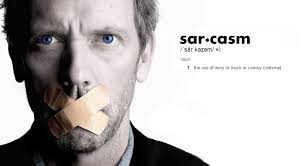歡迎您加入 英文/知識/交友 文章請點選欄位
週五(1/15)1.善與惡2.諷刺語有趣嗎?
上午10:56
No comments
歡迎參加 星期三PM7:30-9:00 新課程
有效實用會話 實用俚語 英文歌曲
例句影片 講義現場提供
板橋區文化路一段421巷11弄1號 (陽光甜味咖啡館)
新埔捷運站1號出口 旁邊7-11巷子進入20公尺 看到夏朵美髮
左轉 聚會時間7:00pm--9:30pm
善與惡
The Real Meaning of 'Good' and 'Evil' stevenmtaylor.co.uk
What do we really mean when we use these simplistic terms, ‘good’ and ‘evil’?
‘Good’ means a lack of self-centredness. It means the ability to empathise with other people, to feel compassion for them, and to put their needs before your own. It means, if necessary, sacrificing your own well-being for the sake of others’. It means benevolence, altruism and selflessness, and self-sacrifice towards a greater cause - all qualities which stem from a sense of empathy. It means being able to see beyond the superficial difference of race, gender or nationality and relate to a common human essence beneath them.
All of the ‘saintly’ people in human history have these qualities in abundance. Think of Mahatma Gandhi and Martin Luther King, risking their own safety and well-being for the goal of gaining equal rights and freedom for Indians and African Americans.These were human beings with an exceptional degree of empathy and compassion, which overrode any concern for their own ambitions or well-being.
‘Evil’ people are those who are unable to empathise with others. As a result, their own needs and desires are of paramount importance. They are selfish, self-absorbed and narcissistic. In fact, other people only have value for them to the extent that they can help them satisfy their own desires, or to which they can exploit them. This applies to dictators like Stalin and Hitler, and to serial killers and rapists - I would argue that their primary characteristics is an inability to empathise with others. They can’t sense other people’s emotions or their suffering, can’t see the world from other people’s perspective, have no sense of their rights. Other human beings are just objects to them, which is what makes their brutality and cruelty possible.
Good and Evil as Flexible
The real difference between this idea of ‘good and evil’ and the traditional concept is that empathy or a lack of empathy aren’t fixed. Although people with a psychopathic personality appear to be unable to develop empathy, for most of us, empathy - or goodness - is a quality that can be cultivated. This is recognised by Buddhism, and most other spiritual traditions. As we practise meditation or mindfulness, and as we become less attached to materialism and status-seeking, we become more open and more connected, and so more selfless and altruistic.
Q:
Are some people just born evil? Or just born kindness?
Are you willing sacrifice your own well-being for the sake of others?
Are serial killers born or created?
What do you think about altruism and egoism?
How to cultivate compassion for someone you dislike?
How to show empathy?

諷刺語有趣嗎?
Think Sarcasm is Funny? Think Again Copyright by Clifford N. Lazarus, Ph.D. Psychologytoday
Sarcasm is really just hostility disguised as humor
If you want to be happier and improve your relationships, cut out sarcasm since sarcasm is actually hostility disguised as humor. Despite smiling outwardly, most people who receive sarcastic comments feel put down and usually think the sarcastic person is a jerk. Indeed, it’s not surprising that the origin of the word sarcasm derives from the Greek word “sarkazein” which literally means “to tear or strip the flesh off.” Hence, it’s no wonder that sarcasm is often preceded by the word “cutting” and that it hurts.
What’s more, since actions strongly determine thoughts and feelings, when a person consistently acts sarcastically it usually only heightens his or her underlying hostility and insecurity. After all, when you come right down to it, sarcasm is a subtle form of bullying and most bullies are angry, insecure, cowards. Alternatively, when a person stops voicing negative comments, especially sarcastic and critical ones, he or she soon starts to feel happier and more self-confident. Also, the other people in his or her life benefit even faster because they no longer have to hear the emotionally hurtful language of sarcasm.
Now I’m not saying all sarcasm is bad. It’s just better used sparingly – like a potent spice in cooking. Too much spice and the dish will be overwhelmed by it. Similarly, an occasional dash of sarcastic wit can spice up a chat and add an element of humor to it. But a big or steady serving of sarcasm will overwhelm the emotional flavor of any conversation and taste very bitter to its recipient.
Q:
Is using sarcasm good while chatting?
Is it good to put somebody down?
What are the topics should be avoid when meeting someone new?
What are the factors that increase hostility?
How to avoid using personal judgment words?
How to deal with a sarcastic person?
訂閱:
張貼留言 (Atom)


















0 意見:
張貼留言